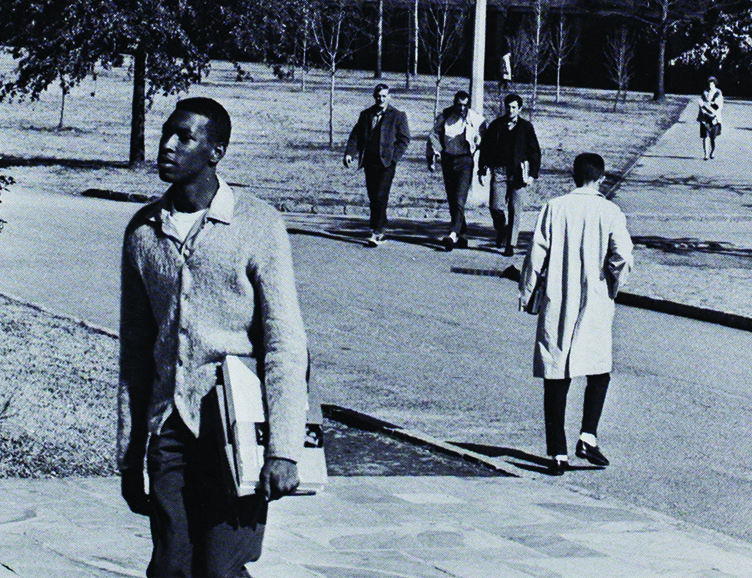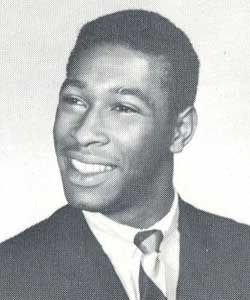Today is Joseph Vaughn Day

On Jan. 4, 1965, newly elected President Lyndon B. Johnson announced his “Great Society” domestic agenda to end poverty and racial injustice. Two months later, on March 7, state troopers brutally beat civil rights activists in Selma, Alabama, on a day that would come to be called Bloody Sunday.
On Jan. 29 that year, between those historical events, Joseph Vaughn walked across Furman’s campus as the university’s first African American undergraduate student, with each step representing a significant stride toward racial equality. A photo taken on a cool, sunny morning that winter shows him ascending the steps of Duke Library, books tucked under his arm and a sweater buttoned against the chill.
On Wednesday, Jan. 29, 2020, Furman will start an annual tradition, Joseph Vaughn Day, to honor the man who took those first bold steps. He graduated, cum laude, in 1968 and taught English in Columbia and Greenville, South Carolina, for 13 years. He died in 1991.
“It is impossible for us today to fully understand the courage of Joseph Vaughn’s convictions, and we can’t understate his influence on Furman, on higher education and on South Carolina,” Furman President Elizabeth Davis said. “He simply sought a college education, an opportunity denied many people before him based solely on the color of their skin. We still have a lot of work to do, but Joseph Vaughn Day will celebrate his legacy and the progress we’ve made toward inclusion.”
According to a short history by Brian Neumann ’13, currently a doctoral candidate in history at the University of Virginia, Vaughn said attending Furman was a dream fulfilled. He wanted a quality education to “be of significant service to my people, my community, my state and my country.”
Vaughn said he did not come to Furman to be “part of any great movement … not any monumental precedent,” but neither did he sit idly by. He was active on campus, joining the Pershing Rifles, becoming a cheerleader and acting in plays. His senior year he was vice president of the Southern Student Organizing Committee and led a small march in Greenville to protest the Orangeburg Massacre. Two months later, weeks before his graduation, he led another march in memory of assassinated civil rights leader Martin Luther King Jr.
As a teacher, Vaughn was president of the South Carolina Education Association, and after teaching he served on the Governor’s Task Force on Critical and Human Needs and on a Blue Ribbon Task Force on the South Carolina Educational Improvement Act, when Dick Riley ’54 served as governor.
Joseph Vaughn Day builds on a student walk held last year, on Jan. 29, from Furman Hall to the Duke Library. The walk was organized by Adare Smith ’20 and sponsored by the English department. It is also one of many initiatives that stem from the work of the Task Force on Slavery and Justice, which sought to understand and acknowledge the university’s historical connections with slavery. In its “Seeking Abraham” report, the task force made a number of recommendations, including tangible ways to recognize on campus the contributions of African Americans to the university. In May, the Board of Trustees approved several recommendations related to physical changes to the campus, including commissioning a statue of Vaughn and creating a place of celebration and reflection. The planning for the statue and space is underway.
Joseph Vaughn Day will begin at 12:15 p.m. near the steps of the Duke Library, the location of the iconic photo of Vaughn and the site of the future statue honoring him. The Furman University Gospel Ensemble will sing as the community gathers for a short commemorative walk along Milford Mall to the Furman Chapel. Participants are encouraged to wear purple as a show of inclusion and belonging.
At 12:30 p.m., the program will begin, with comments from President Davis and Board Chair Alec Taylor. Lillian Brock-Flemming ’71, one of the first three African American women to attend Furman and a longtime Greenville City Council member, will read a selection from the official proclamation creating Joseph Vaughn Day in Greenville, and Smith will accept the proclamation on behalf of the university. Rodney Acker ’73 will read from the Baha’i faith; Marcus Tate, Vaughn’s cousin, will share a remembrance of Vaughn; and Stephen O’Neill, professor of history, will give closing remarks.
At 6 p.m. in the Trone Student Center’s Watkins Room, a Cultural Life Program features a talk, “Struggling to Learn: Schools, Racial Inequality and the Civil Rights Era in South Carolina,” by June Manning Thomas, the Centennial Professor of Urban and Regional Planning and the Mary Frances Berry Distinguished University Professor of Urban Planning at the University of Michigan Taubman College of Architecture and Urban Planning.
On Feb. 15, the Tabernacle Baptist Church in Greenville will host the Joseph Vaughn Oratorical Competition, co-sponsored by Furman and Alpha Phi Alpha Greenville Foundation. The contest encourages public speaking skills among students in the spirit of Vaughn and of Martin Luther King Jr. For more information, contact Mike Chatman of the Alpha Phi Alpha Greenville Foundation at jvoc@alphagreenville.org or 864-906-7078.
